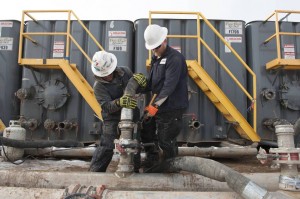from The Wall Street Journal,
3/20/15:
New standards for oil and gas wells will address chemical disclosures and wastewater disposal.

The Obama administration issued comprehensive rules on hydraulic fracturing, trying to set a national standard for controversial drilling practices that have helped fuel the U.S. oil and natural-gas boom.
Friday’s move sparked immediate criticism from energy companies that claimed the rules are too onerous. Two industry groups filed a lawsuit minutes after the announcement, seeking to block the rules in a federal court. Environmental groups said the rules don’t go far enough.
The new rules from the Interior Department have been in the works since 2012 and apply to oil-and-gas drilling on federal lands, which produce 11% of the natural gas consumed in the U.S. and 5% of the oil, according to data from the agency. More than 90% of new land-based wells in the U.S. use hydraulic fracturing, known as fracking.
Drilling on private or state-owned land won’t be subject to the new federal standards, but states and companies could move to bring their practices in line with the U.S. While big energy-producing statessuch as Colorado, North Dakota, Pennsylvania and Texas regulate fracking already, there have been no overarching standards.
“It’s a complex matrix of regulations out there,” said Neil Kornze, director of the Interior Department’s Bureau of Land Management. “In some places, this has been addressed. In other places it has not. We’ve attempted to build a rule that will interface in a positive way with those states that have moved forward and will provide a common baseline across the country in all states.”
But fracking is controversial because of qualms about environmental impact, especially the potential to contaminate drinking-water supplies.
“There is a lot of fear and public concern, particularly about the safety of groundwater and the impact of these operations,” Interior Secretary Sally Jewell said Friday.
Analysts said parts of the federal regulations are as strict as or stricter than what many states have implemented, though state rules vary.
For example, the new federal rules require more stringent standards than many states have for storage of toxic fluids recovered from a fracking well. U.S. officials said companies must secure wastewater in covered tanks before permanent disposal, instead of using pits dug in the ground.
Ten states now require at least some of the fluids used in fracking to be stored in covered tanks, said Resources for the Future, an environmental think tank in Washington. Storing leftover liquids in open pits has been common in Texas and North Dakota, which recently outlawed the practice.
“We think this is going to be a template for how the federal government expects the states to regulate water as part of their own oversight of fracking,” said Kevin Book, managing director of energy research firm ClearView Energy Partners.
The government estimated an industrywide cost of $32 million a year, up from an earlier estimate of $12 million to $20 million.
The likelihood of higher fracking costs comes as U.S. oil and gas producers are struggling with persistently low natural-gas prices and a roughly 50% drop in the price of crude in the past year. The collapse in oil prices has prompted many drillers to slash their budgets and lay off workers.
More From The Wall Street Journal (subscription required):













